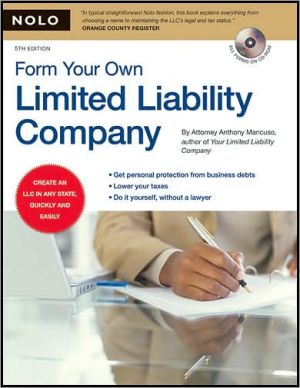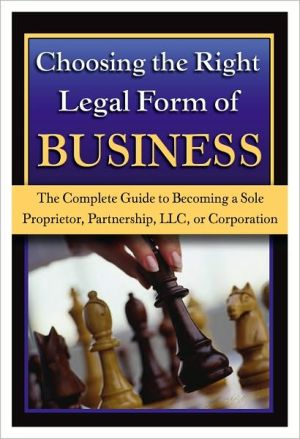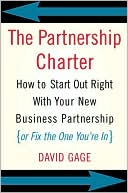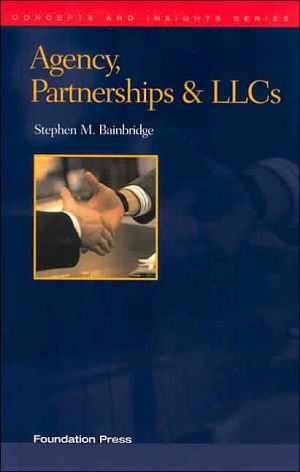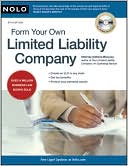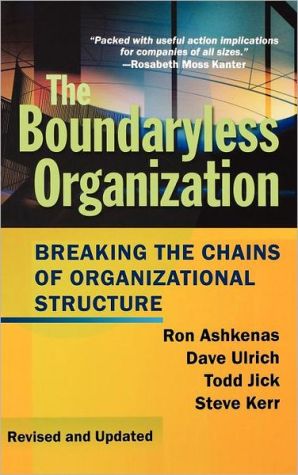Form Your Own LLC
Everything you need to form your own LLC!\ \ Limited liability companies provide the most flexible way of doing business: You get both the tax benefits of a partnership, and the personal protection from business debts provided to corporations.\ \ Form Your Own Limited Liability Company provides you with the step-by-step instructions and forms you need to form an LLC in your state, without the expense of hiring a lawyer. This bestseller covers how to:\ \ choose an LLC name\ prepare and file...
Search in google:
The plain-English information and forms you need to create an LLC in your state. Orange County Register In typical straightforward Nolo fashion, this book explains everything from choosing a name to maintaining the LLC's legal and tax status.
Introduction\ In this chapter, we'll cover the nuts and bolts of the limited liability company, or "LLC": the most common questions, the primary benefits, which businesses should choose LLC status, and what other types of business entities there are. We'll delve into the specific legal and tax characteristics of LLCs in the next two chapters.\ If you are familiar with LLCs. If you have followed the development of the LLC over the last few years and know its general legal and tax characteristics (or you simply want to look at the specifics of forming an LLC right now), you can skip the introductory material in this and the following two chapters. Move right ahead to Chapter 4, where you'll learn how to prepare LLC articles of organization.\ \ Top Ten Questions About LLCs\ 1. What is an LLC?\ An LLC is a business structure that gives its owners corporate-style limited liability, while at the same time allowing partnership-style taxation.\ \ Like owners of a corporation, LLC owners are protected from personal liability for business debts and claims -- a feature known as "limited liability." This means that if the business owes money or faces a lawsuit, the assets of the business itself are at risk but usually not the personal assets of the LLC owners, such as their houses or cars.\ \ \ Like owners of partnerships or sole proprietorships, LLC owners report their share of the business profits or losses on their personal income tax returns. The LLC itself is not a separate taxable entity.\ \ \ \ Because of these attributes, the LLC fits somewhere between the partnership and the\ corporation (or, forone-owner businesses, the sole proprietorship and the one-person\ corporation).\ \ \ 2. How many people do I need to form an LLC?\ You can form an LLC with just one owner. For reasons we'll explain later, LLCs are appropriate for businesses with no more than 35 owners and investors.\ \ \ 3. Who should form an LLC?\ Consider forming an LLC if you are concerned about personal exposure to lawsuits arising from your business. For example, an LLC will shield your personal assets from:\ \ suppliers' claims for unpaid bills, and\ \ \ for businesses that deal directly with the public, slip-and-fall lawsuits that your\ commercial liability insurance policy may not adequately cover.\ \ \ \ Not all businesses can operate as LLCs, however. Those in the banking, trust, and insurance industries, for example, are typically prohibited from forming LLCs. Some states (including California) prohibit licensed professionals such as architects, accountants, doctors, health care workers, lawyers, and other state-licensed practitioners from forming LLCs. Many of these professionals may benefit from forming a limited liability partnership.\ \ \ 4. How do I form an LLC?\ In most states, the only legal requirement to form an LLC is that you file "articles of organization" with your state's LLC filing office, which is usually part of the Secretary of State's office. (Several states refer to this organizational document as a "certificate of organization" or a "certificate of formation.") A few states require an additional step: Prior to or immediately after filing your articles of organization, you must publish your intention to form an LLC, or a notice that you have formed an LLC, in a local newspaper. We'll explain how to prepare and file articles of organization in Chapter 4.\ \ \ 5. Do I need a lawyer to form an LLC?\ You don't need a lawyer. In most states, the information required for the articles of\ organization is simple -- it typically includes the name of the LLC, the location of its principal office, the names and addresses of the LLC's owners and/or managers, and the name and address of the LLC's registered agent (a person or company that agrees to accept legal papers on behalf of the LLC).\ The process itself is simple, too. Most states have fill-in-the-blank forms and instructions that can be downloaded. Some states even let you prepare and file articles online at the state filing website, which means you can create your LLC in a matter of minutes. LLC filing offices increasingly allow owners to send them email questions, too.\ \ \ 6. Does my LLC need an operating agreement?\ Although most states' LLC laws don't require a written operating agreement, don't even\ consider starting an LLC without one. An operating agreement is necessary because it:\ \ sets out rules that govern how profits and losses will be split up, how major business\ decisions will be made, and the procedures for handling the departure and addition of\ members\ \ \ keeps your LLC from being governed by the default rules in your state's LLC laws, which\ might not be to your benefit, and\ \ \ helps ensure that courts will respect your personal liability protection, because it shows that you have been conscientious about organizing your LLC.\ \ \ \ In Chapters 5 and 6, you'll learn how to create an operating agreement.\ \ \ 7. How do LLCs pay taxes?\ Like partnerships and sole proprietorships, an LLC is not a separate entity from its owners\ for income tax purposes. This means that the LLC itself does not pay income taxes. Instead, the LLC owners use their personal tax returns to pay tax on their allocated share of profits (or deduct their share of business losses).\ LLC owners can elect to have their LLC taxed like a corporation. This may reduce taxes for\ established LLC owners who will regularly need to keep a significant amount of profit in the\ company.\ These tax consequences will be discussed in detail in Chapter 3.\ \ \ 8. What are the differences between a limited liability company and a partnership?\ The main difference between an LLC and a partnership is that LLC owners are not personally liable for the company's debts and liabilities. Partners, on the other hand, do not have this limited liability protection. Also, owners of limited liability companies must file formal articles of organization with their state's LLC filing office, pay a filing fee, and comply with other state filing requirements before they open for business. Partners don't need to file any formal paperwork and don't have to pay special fees.\ LLCs and partnerships are almost identical when it comes to taxation, however. In both\ types of businesses, the owners report business income or losses on their personal tax returns. In fact, co-owned LLCs and partnerships file the same informational tax return with the IRS (Form 1065) and distribute the same schedules to the business's owners (Schedule K-1, which lists each owner's share of income).\ \ \ 9. Can I convert my existing business to an LLC?\ Converting a partnership or a sole proprietorship to an LLC is an easy way for partners and sole proprietors to protect their personal assets without changing the way their business income is taxed. Some states have a simple form for converting a partnership to an LLC (often called a "certificate of conversion"). Partners and sole proprietors in states that don't use a conversion form must file regular articles of organization to create an LLC.
1. Overview of the LLCTop Ten Questions About LLCsThe Benefits of LLCsWhich Businesses Benefit as LLCs?Comparing LLCs and Other Business FormsBusiness Entity Comparison Tables2. Basic LLC LegalitiesNumber of MembersPaperwork Required to Set Up an LLCResponsibility for Managing an LLCMember and Manager Liability to Insiders and OutsidersAre LLC Membership Interests Considered Securities?3. Tax Aspects of Forming an LLCPass-Through TaxationHow LLCs Report and Pay Federal Income TaxesLLCs and Self-Employment TaxesState Law and the Tax Treatment of LLCsOther LLC Formation Tax Considerations4. How to Prepare LLC Articles of OrganizationRead State Sheets and Order LLC MaterialsReview and Organize Your State's LLC InformationChoose a Name for Your LLCCheck Your State's Procedures for Filing ArticlesPrepare LLC Articles of OrganizationFinalize and File Your Articles of OrganizationWhat to Do After Filing Articles of Organization5. Prepare an LLC Operating Agreement for Your Member-Managed LLCScope of Our Basic LLC Operating AgreementsCustomizing Your LLC Operating AgreementHow to Prepare a Member-Managed LLC Operating AgreementDistribute Copies of Your Operating Agreement6. Prepare an LLC Operating Agreement for ManagersChoosing a Manager-Managed LLCHow to Prepare an LLC Management Operating AgreementDistribute Copies of Your Operating Agreement7. After Forming Your LLCIf You Converted an Existing Business to an LLCBasic Tax Forms and FormalitiesOngoing LLC Legal Paperwork and ProceduresOther Ongoing LLCFormalities8. Lawyers, Tax Specialists, and Legal ResearchFinding the Right Tax AdviserHow to Find the Right LawyerHow to Do Your Own Legal ResearchA. Appendix A: State SheetsB. Appendix B: Tear-Out LLC FormsIRS Form 8832, Entity Classification ElectionLLC Filing Office Contact LetterLLC Reservation of Name LetterArticles of OrganizationLLC Articles Filing LetterOperating Agreement for Member-Managed Limited Liability CompanyLimited Liability Company Management Operating AgreementMinutes of MeetingCertification of AuthorityC. Appendix C: How to Use the CD-ROMInstalling the Form Files Onto Your ComputerUsing the Word Processing Files to Create DocumentsUsing the IRS FormFiles Included on the Forms CDIndex
\ BusinessWeekGood news from the IRS... you, too, can be an LLC. The advantage: profits are taxed just once, like a partnership, while personal liability is limited, like a corporation. [And now you can do it yourself with] Nolo's book on LLCs.\ \ \ \ \ Money Maker's MonthlyArmed with this book, entrepreneurs... can take advantage of the unique tax and legal benefits of the LLC for less than the cost of 10 minutes of their own lawyer's time.\ \ \ Orange County RegisterIn typical straightforward Nolo fashion, this book explains everything from choosing a name to maintaining the LLC's legal and tax status.\ \ \ \ \ Business WeekGood news from the IRS...you, too, can be an LLC. The advantage: profits are taxed just once, like a partnership, while personal liability is limited, like a corporation. [And now you can do it yourself with] Nolo's book on LLCs.\ \ \ \ \ Business WeekGood news from the IRS...you, too, can be an LLC. The advantage: profits are taxed just once, like a partnership, while personal liability is limited, like a corporation. [And now you can do it yourself with] Nolo's book on LLCs.\ \ \ \ \ Money Makers MonthlyArmed with [Form Your Own Limited Liability Company] entrepreneurs...can take advantage of the unique tax and legal benefits of the LLC for less than the cost of 10 minutes of their own lawyer’s time.\ \ \ \ \ Money Makers MonthlyArmed with [Form Your Own Limited Liability Company] entrepreneurs...can take advantage of the unique tax and legal benefits of the LLC for less than the cost of 10 minutes of their own lawyer’s time.\ \ \ \ \ Orange County RegisterIn typical straightforward Nolo fashion, this book explains everything from choosing a name to maintaining the LLC's legal and tax status.\ \ \ \ \ Orange County RegisterIn typical straightforward Nolo fashion, this book explains everything from choosing a name to maintaining the LLC's legal and tax status.\ \ \ \ \ Orange County Register"In typical straightforward Nolo Press fashion, this book explains everything from choosing a name to maintaining the LLC's legal and tax status."\ \
